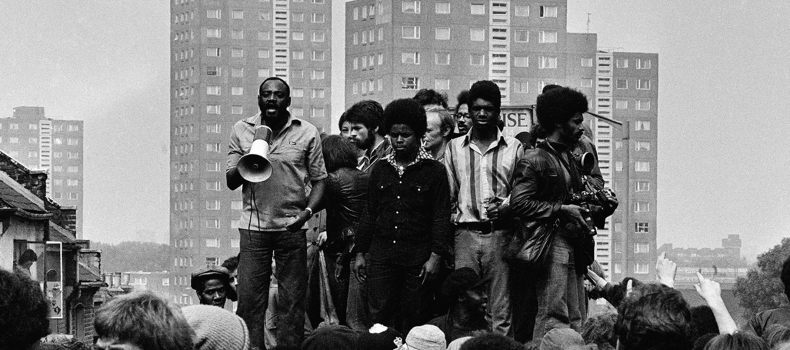History is a record of the situations, determinations and actions of the individuals who went on to effect changes in the annals of times. There were prophets, messiahs, emperors and revolutionaries. And there are some who encountered their own moments and responded to them in unique, inspired, decisive and contributory ways.
[The Darcus Howe Legacy seeks to celebrate and perpetuate the thoughts, works and leadership of one of the most significant presences in post-colonial Britain, in the era of immigrant settlement from its ex-colonies in the ‘sceptred isles’.]
This website is dedicated to the spirit and continuity of Darcus Howe’s writings, broadcasts, fighting organisation and traditions of action he leaves us with. It intends to inspire the future.
Darcus was a maverick when the tensions of the age called for defiance and rebellion. He was a leader when the new communities of Britain, from South Asia, the Caribbean and Africa desperately called for leadership. He was a ‘rabble-rouser’ when there was no alternative to latent British institutional racism but to engage, stimulate and lead a population that was struggling to discard the label of ‘rabble’.
Darcus came to Britain when he was 18 to study law. He came to public prominence as a defendant in the famous Mangrove trial in which he and eight others were arrested during a demonstration protesting against the police victimization of a Caribbean restaurant and of black people generally. The trial in which Darcus defended himself resulted in his acquittal of absurd charges of conspiracy and affray.
The Mangrove trial, named after the restaurant which was regularly raided without justification by the police, was a watershed in English jurisprudence. It defined new relationships between seasoned white lawyers and black defendants. It presented the British judicial establishment withthe truth about the presence, role and defiant voice of Britain’s new ethnic population. It gave the British public one of the first glimpses of the living experience of the labour force they had invited to immigrate to these islands.
Following the Mangrove trial Darcus joined and was a leading member of the Black Panther Movement, which for the first time in the history of ethnic- immigrant settlement gave organizational form to a radical claim to social, economic and political rights.
As though that weren’t enough – and perhaps it wasn’t – Darcus went on to edit Race Today . The magazine was a unique platform for reports of the radical actions of the ethnic communities, very significantly black and Asian, their dilemmas and their activities. The platform’s mission spawned active movements and organisations, such as the Bengali Housing Action Group in East London, which were hugely successful and materially significant for the communities who activated them.
The New Cross Fire in which 13young people lost their lives while attending a party became a British cause celebre and Darcus, with the Race Today Collective, organized The Black People’s day of Action with over 20,000 people to seek justice and closure for the victims of the fire and for freedom from racist attacks for the black population.
His activity as a voice of radicalism brought him a career in TV which introduced into the national conversation his radical stances in programmes such as the Bandung File and Devil’s Advocate. His journalism in the New Statesman, Evening Standard and Voice brought his incisive analysis on the issues of the day to a wider audience.
He campaigned successfully to Keep Carnival on the streets and as a passionate Carnivalist played mas both in Trinidad and the UK. The band he co-founded Race Today Mangrove Renegades won band of the year for three successive years with their portrayal of revolutionary themes.
This website and archive is not a static appreciation of what went before. It is dedicated to the continuing conversation, perhaps for generations, in these islands and in our fast- shrinking world, inspired by the voice and work of Darcus Howe.
